
Director: Otto Preminger
Starring: Dana Andrews, Gene Tierney, Clifton Webb, Vincent Price
Year: 1944
Country of origin: USA
Language: English
Synopsis: Laura (Gene Tierney) is found murdered in an apartment, Detective Mark McPherson (Dana Andrews) investigates a trio of middle/high class suspects who all have reasons to want her dead.
What Indie Nights? review

Happy Tuesday Bbbg-ers. Hope your respective weeks were fabulous. Welcome to another noir extravaganza, a somewhat subtle example of the genre, to say the least.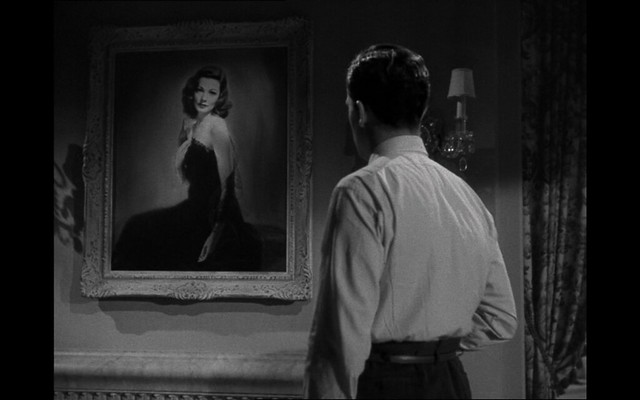
I have to say that Laura is definitely the least obvious noir we've watched so far (discounting The Glass Key, which was so far off the mark that we took it off the list). It has none of the genre's indicators that we've come to look out for: the lighting is notably lacking in starkness and there are only a minimum number of venetian blinds, and even those aren't used to the full effect. There are some great shadows cast by hats on faces, some trenchcoats are worn in the rain like there's no tomorrow, and cigarettes are smoked like they're going out of style, but truthfully, these elements are probably present in every film made in the era and taken separately they do not constitute a film noir.
Another point of contention is that there is really no femme fatale, no actual criminals in the conventional sense at all; there is, in fact, no seedy underbelly of society on which the viewer can place all the blame and feel justified.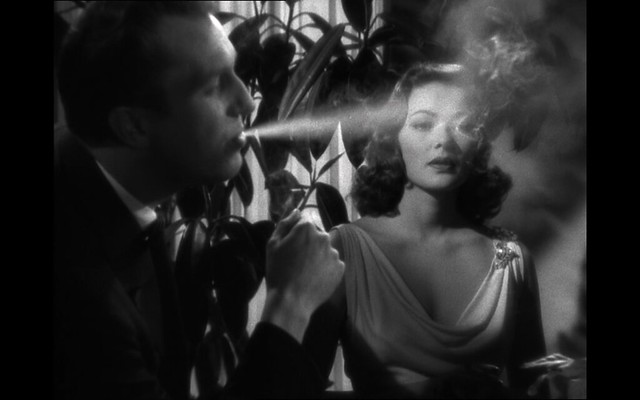
Indeed, Laura is unflinching in the method in which the criminal is brought to light - we suspect all the usual players (the slimy gold-digging boyfriend, the jealous older woman, the maid, the cop himself) but in the end we are forced to face the fact that the murderer had no underlying criminal tendencies, and that his motives were extremely personal, a fact that is much more unsettling than the ease of blaming it all on the criminal underworld.
It is here, of course, that the film deviates from traditional noir - another novel adaptation, it displays many more of the characteristics of a classic Agatha Christie-like detective story than of a hardboiled crime novel. And there is more than a little of the Queen of Crime's touch to Laura - it is above all a story of relationships, of the intricacies of human beings' complex and twisted feelings towards one another.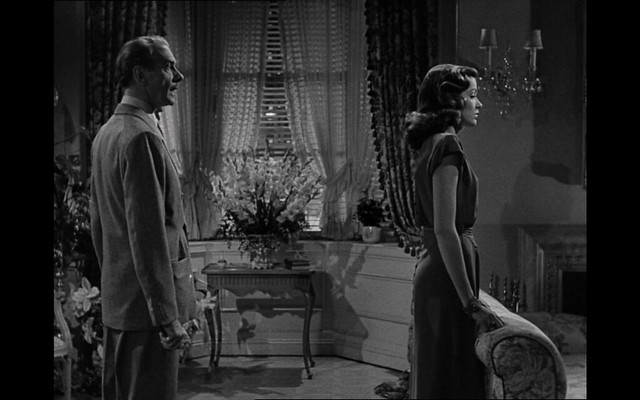
This is made far knottier by the sexual confusion running rife beneath the film's outer layer - the Lydecker character, written in the novel as a homosexual, has to be played straight to satisfy the morality code, and the cop's clear sexual ambiguity makes for relationships completely lacking in tension and chemistry, including one of the most wimpy first (and only) kisses ever to be set down on celluloid. Unfortunately, the adherence to traditional class values combined with the casting of obviously gay actors means the characters are not really played properly, and serves only to give the entire story a gleam of unreality and untruth.
Ultimately, because of all this, the film doesn't linger with the viewer, and we are left with the vague feeling that there was something we didn't quite get, or that something terribly important was left out, and if we could only scratch that itch, everything would fall into place. It is an itch, however, that will not get scratched.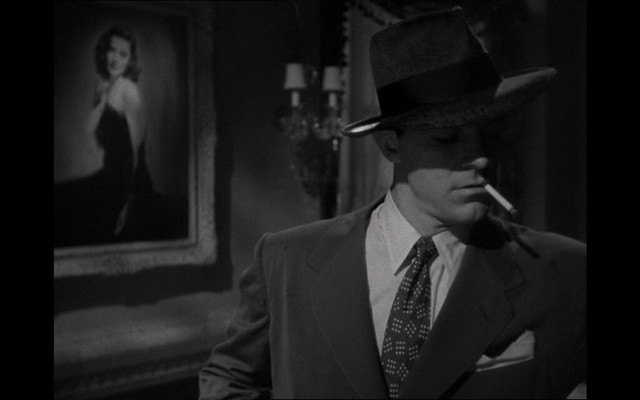
Blahblahblahtoby review
There is a lot less of the traditional noir use of high contrast light and shadow, being replaced by a lot more of the warmth and soft lighting of society apartments and whilst the ghost of Laura has a strong hold over these men she is far from a femme fatale; her role is largely passive despite times when (as is standard for women in noir) she is painted as untrustworthy.
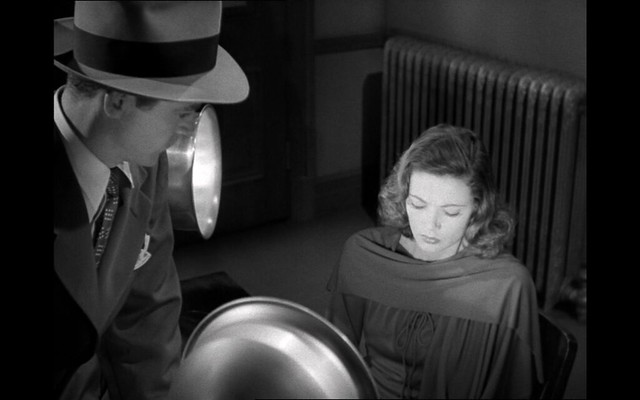
On face value this isn't really a noir, it's closer to a Hitchcockian melodrama, but I think this is our first encounter with Dugnant's Middle Class Murder theme. We have a not-quite-hard-boiled detective investigating a society murder who finds himself followed around by three overly helpful yet not too concerned suspects whilst becoming ensnared by an obsession with the victim, Laura.
There's no doubting the fact that Gene Tierney is a beautiful woman, but also smart and determined, her character, in flashback, blazing the trail later followed by Peggy in Mad Men as she climbs the ladder in a male dominated advertising agency. However at no point do you get the impression that she would lie, cheat or persuade men to kill for her. This leaves her as nothing more than a bauble for men to crave.
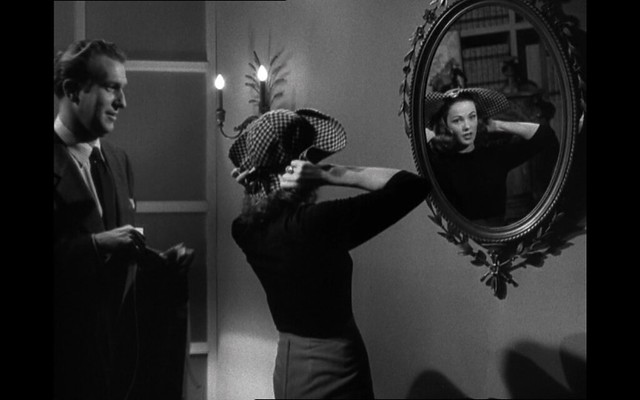
The extroverted, idiosyncratic performance of Clifton Webb as Waldo Lydecker is almost a show stealer; witty, erudite, pompous and a self-applauding manner is a whole lot of fun to watch; "in my case, self-absorption is completely justified. I have never discovered any other subject quite so worthy of my attention." He baits the other characters and always has a reproach waiting for them in response. His complete contrast with Dana Andrews adds an extra layer to proceedings; calling him, with obvious contempt, "muscular and handsome in a cheap sort of way" whilst constantly trying to undermine his actions.
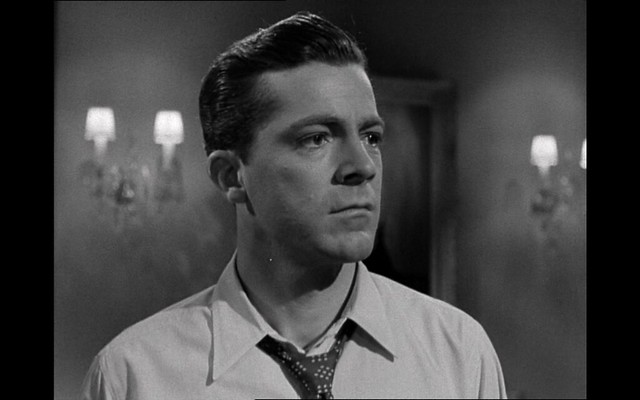
Andrews for his part seems to be channeling the Alan Ladd school of film noir hero and gives a subtly great performance as the pragmatic, unromantic, typically masculine cop adding meaning to scenes with a simple facial gesture that could easily get missed by the unobservant viewer.
I noticed nothing special in Preminger's direction, it is solid if not spectacular and includes some long takes in which the camera follows the characters around the sets, lingering on some of the homoerotic moments between the two male leads - Andrews initial interview with Webb starts with Webb in the bath and continues as he dries himself in front of Andrews! - and at times giving you a sense that you are another of the suspects tagging along with the detective.
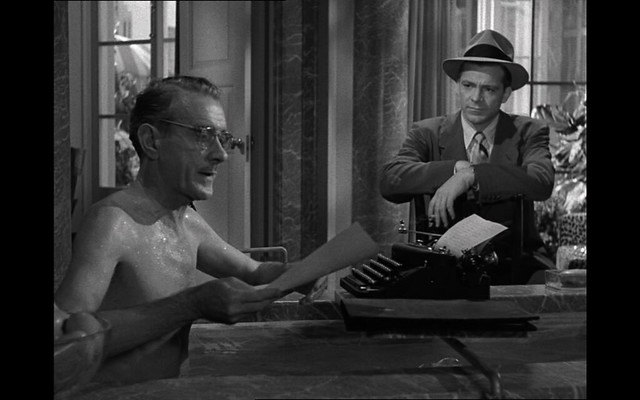
In terms of theme, aside from being populated by morally corrupt people who treat murder lightly (Middle Class Murder) there's more than a hint of Sexual Pathology and Portraits & Doubles throughout. I believe the three motifs will turn out to be intrinsically linked as the Noir-a-Thon rolls onwards.
Laura is a highly enjoyable film but also quite forgettable. I had seen this one a few years ago and had completely forgotten that I'd already seen it by the time I pressed play this time round. It is however definitely worth watching.
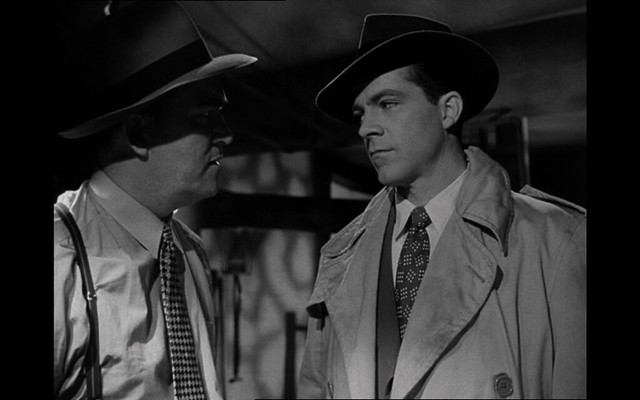
I know Brian saw this recently but has anyone else seen it? What did you think? Anyone adding it to their watchlist? Leave me some blah below.
And now for some coming attractions

Interesting thoughts from both of you on how you argue that this is more of a whodunnit flick, rather than a film noir. I do consider it a film noir and have found over the years that its dream-like qualities and ambigous characters are deeply fascinating. Clifton Webb's character is very dark and disturbed and I love his obsessive father-figure like hang-ups. I grant you that this one is probably a more glossy, mainstream example of a film noir. It's still a wonderful film though and I like it much more than you do. As for Gene Tierney not being a femme fatale, I feel in fact she is. Seems to me that for the Lydecker character, she is a femme fatale most assuredly.
ReplyDelete@JON - thanks for stopping by again my friend. i definitely would define this as a noir, it has three of the major signifiers after all. just not the ones we've experienced so far. it's a first of its kind, at least for the noir-a-thon.
ReplyDeletei tried to skip over the dream-like aspect as it has the potential to become a spoiler but that aspect alone is worth a whole lot of debate.
i see your point on the femme fatale issue but i think in this instance it is more lydecker leading himself astray, laura's inaction because she didn't want to cause him harm by rejecting him is perhaps the closest she gets to the femme fatale role in my opinion.
I've never really thought of it as noir, but it is a murder mystery that came out in the 1940s, so it ends up getting lumped in with all the Maltese Falcon clones.
ReplyDeleteFrom your post I guess you didn't like the movie as much as I did. I liked the Gene Tierney character quite a bit. And as you said, she is very beautiful. Check her out in Leave Her to Heaven sometime.
CHIP - it's included in the Film Noir Encyclopedia, hopefully those guys can tell.
ReplyDeleteI'm perplexed at how both you and Jon got the impression that I didn't like it. I know Leah didn't think too much of it but I thought it was pretty good, an enjoyable piece of entertainment. Perhaps an ammendment in my writing style is required. LEAVE HER TO HEAVEN is actually the first film from 1945 on my noir-a-thon bookcase so it's coming up in 3 movies time. The blurb on the back of the box is terrible but I have high hopes.
Goodness, I really should see this already. I promised my friend who contributed a guest review of this film a year ago or so. Nice touch adding those great retro posters, Toby.
ReplyDelete@RUTH - thanks, i love researching the posters, the art is always extremely interesting. do see it, i'm sure the review on your site was enough but now you have two people telling you to see it.
ReplyDelete@Toby - Leave Her to Heaven is listed as a noir movie, too? It's even further from the genre than Laura is. It sounds like anything involving a woman and a crime in the 1940s is being labelled noir by the source you are using. In any case, I still recommend the movie.
ReplyDelete@CHIP - interesting. you're making me lose hope. it's listed in Alin Silver's Film Noir Encyclopaedia although there was also a review from the new york post which among other things included the line "the gorgeous Gene Tierney's homicidally jealous Ellen Berent is the fatalest of femmes in this gorgeously restored classic"
ReplyDeleteLaura is definitely a noir, it's just not the hard boiled private eye/anti-hero school of noir.
Nice writeups (and photos)! This movie's plot twist caught me offguard on my initial viewing, and it made for a very interesting second half. It's not one of the best noirs I have seen, but still a good one. Plus it gets special points from me for being the first non-horror role I had seen from Vincent Price. :)
ReplyDelete@ERIC - The second the twist happens I sat up and paid more attention, when there's so much talk of that Hitchcock movie doing something similar in 1960 I would've hoped that this would've received more praise for it's subversion of narrative stroytelling. As a non-horror movie viewer I am actually unfamiliar with Price as an actor despite knowing the name.
ReplyDeleteI don't know if I would count "Leave Her to Heaven" as a noir, but Tierney turns in a pretty fabulous femme fatale performance there. Look forward to it.
ReplyDelete